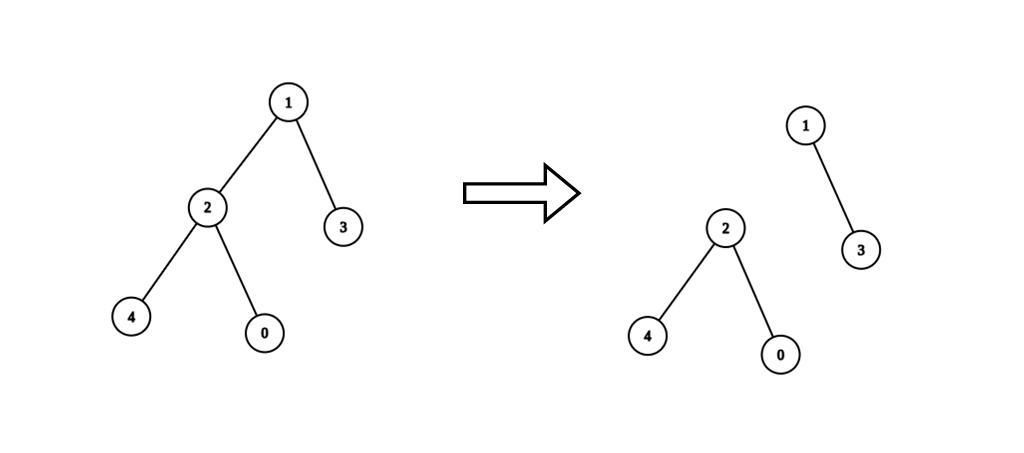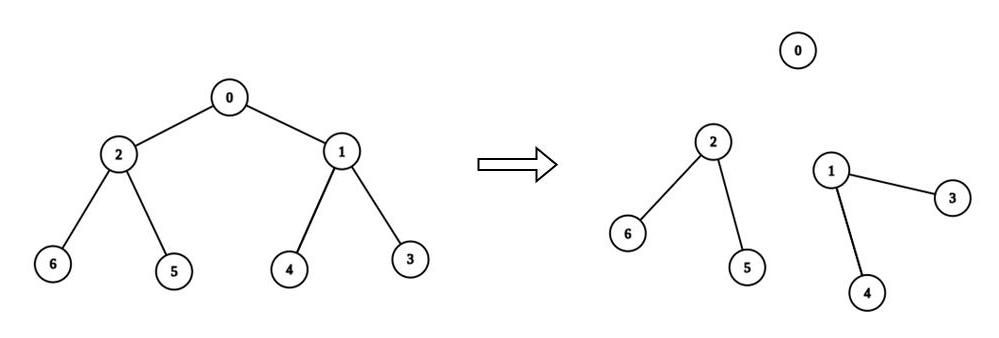Welcome to Subscribe On Youtube
2872. Maximum Number of K-Divisible Components
Description
There is an undirected tree with n nodes labeled from 0 to n - 1. You are given the integer n and a 2D integer array edges of length n - 1, where edges[i] = [ai, bi] indicates that there is an edge between nodes ai and bi in the tree.
You are also given a 0-indexed integer array values of length n, where values[i] is the value associated with the ith node, and an integer k.
A valid split of the tree is obtained by removing any set of edges, possibly empty, from the tree such that the resulting components all have values that are divisible by k, where the value of a connected component is the sum of the values of its nodes.
Return the maximum number of components in any valid split.
Example 1:

Input: n = 5, edges = [[0,2],[1,2],[1,3],[2,4]], values = [1,8,1,4,4], k = 6 Output: 2 Explanation: We remove the edge connecting node 1 with 2. The resulting split is valid because: - The value of the component containing nodes 1 and 3 is values[1] + values[3] = 12. - The value of the component containing nodes 0, 2, and 4 is values[0] + values[2] + values[4] = 6. It can be shown that no other valid split has more than 2 connected components.
Example 2:

Input: n = 7, edges = [[0,1],[0,2],[1,3],[1,4],[2,5],[2,6]], values = [3,0,6,1,5,2,1], k = 3 Output: 3 Explanation: We remove the edge connecting node 0 with 2, and the edge connecting node 0 with 1. The resulting split is valid because: - The value of the component containing node 0 is values[0] = 3. - The value of the component containing nodes 2, 5, and 6 is values[2] + values[5] + values[6] = 9. - The value of the component containing nodes 1, 3, and 4 is values[1] + values[3] + values[4] = 6. It can be shown that no other valid split has more than 3 connected components.
Constraints:
1 <= n <= 3 * 104edges.length == n - 1edges[i].length == 20 <= ai, bi < nvalues.length == n0 <= values[i] <= 1091 <= k <= 109- Sum of
valuesis divisible byk. - The input is generated such that
edgesrepresents a valid tree.
Solutions
Solution 1: DFS
We notice that the problem guarantees that the sum of the node values in the entire tree can be divided by $k$, so if we remove an edge whose weight is divisible by $k$, then the sum of the node values in each connected component that remains can also be divided by $k$.
Therefore, we can use depth-first search to traverse the entire tree starting from the root node. For each node, we calculate the sum of all node values in its subtree. If this sum can be divided by k, then we increment the answer by one.
The time complexity is $O(n)$, and the space complexity is $O(n)$, where n is the number of nodes in the tree.
-
class Solution { private int ans; private List<Integer>[] g; private int[] values; private int k; public int maxKDivisibleComponents(int n, int[][] edges, int[] values, int k) { g = new List[n]; Arrays.setAll(g, i -> new ArrayList<>()); for (int[] e : edges) { int a = e[0], b = e[1]; g[a].add(b); g[b].add(a); } this.values = values; this.k = k; dfs(0, -1); return ans; } private long dfs(int i, int fa) { long s = values[i]; for (int j : g[i]) { if (j != fa) { s += dfs(j, i); } } ans += s % k == 0 ? 1 : 0; return s; } } -
class Solution { public: int maxKDivisibleComponents(int n, vector<vector<int>>& edges, vector<int>& values, int k) { int ans = 0; vector<int> g[n]; for (auto& e : edges) { int a = e[0], b = e[1]; g[a].push_back(b); g[b].push_back(a); } function<long long(int, int)> dfs = [&](int i, int fa) { long long s = values[i]; for (int j : g[i]) { if (j != fa) { s += dfs(j, i); } } ans += s % k == 0; return s; }; dfs(0, -1); return ans; } }; -
class Solution: def maxKDivisibleComponents( self, n: int, edges: List[List[int]], values: List[int], k: int ) -> int: def dfs(i: int, fa: int) -> int: s = values[i] for j in g[i]: if j != fa: s += dfs(j, i) nonlocal ans ans += s % k == 0 return s g = [[] for _ in range(n)] for a, b in edges: g[a].append(b) g[b].append(a) ans = 0 dfs(0, -1) return ans -
func maxKDivisibleComponents(n int, edges [][]int, values []int, k int) (ans int) { g := make([][]int, n) for _, e := range edges { a, b := e[0], e[1] g[a] = append(g[a], b) g[b] = append(g[b], a) } var dfs func(int, int) int dfs = func(i, fa int) int { s := values[i] for _, j := range g[i] { if j != fa { s += dfs(j, i) } } if s%k == 0 { ans++ } return s } dfs(0, -1) return } -
function maxKDivisibleComponents( n: number, edges: number[][], values: number[], k: number, ): number { const g: number[][] = Array.from({ length: n }, () => []); for (const [a, b] of edges) { g[a].push(b); g[b].push(a); } let ans = 0; const dfs = (i: number, fa: number): number => { let s = values[i]; for (const j of g[i]) { if (j !== fa) { s += dfs(j, i); } } if (s % k === 0) { ++ans; } return s; }; dfs(0, -1); return ans; }